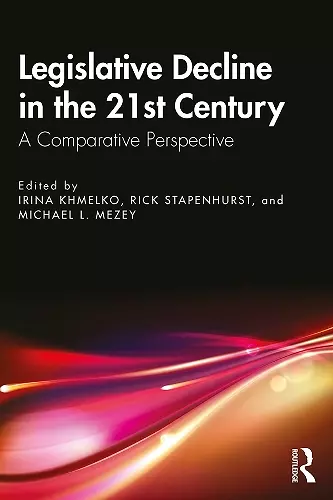Legislative Decline in the 21st Century
A Comparative Perspective
Michael L Mezey editor Rick Stapenhurst editor Irina Khmelko editor
Format:Hardback
Publisher:Taylor & Francis Ltd
Published:4th Feb '20
Currently unavailable, and unfortunately no date known when it will be back
This hardback is available in another edition too:
- Paperback£39.99(9780367342951)

Irina Khmelko, Frederick Stapenhurst, and Michael L. Mezey have assembled an authoritative guide to the declining institutional capacities of legislatures around the world.
Case studies represent a diverse sample of countries, ranging from newer democracies emerging from the post-communist world to more established but at times fragile democracies in Asia. Although largely focused on newer democratic systems, readers will be able to identify key factors that explain the general global trend toward the empowerment of executives at the expense of national legislatures. The cases, although different from one another, identify several factors that have explained the erosion of legislative power, including historical legacies, institutional design, economic factors, external factors, political polarization, personalization of politics, and the rise of populism. Original data and the presentation of testable theoretical propositions about the growing imbalance between executives and national legislatures moves the field in a promising new direction.
Legislative Decline in the 21st Century will be of interest to students and scholars of Legislative Studies and Comparative Politics. Lessons drawn from these case studies will allow policy makers to explore new solutions that can lead to the improved quality of democracy in countries around the world.
"This timely volume is undoubtedly a must-read for anyone interested in legislative vulnerability, executive dominance, and democratic backsliding in emerging democracies and hybrid regimes. Leading experts on executive-legislative relations examine the main factors accounting for the global decline of legislative power. These include historical legacies, institutional design, economic conditions; globalization, political polarization, and the personalization of the politics. The essays included in this volume skillfully illustrate how these different factors affect executive-legislative relations in the post-communist world (both in Eastern Europe and the Former Soviet Union), sub-Saharan Africa, fledgling democracies (Bangladesh, India, Mexico, Myanmar, and Turkey), as well as in a well-institutionalized democracy (Germany). While highly informative, the content of these chapters, is accessible to both scholars and students." — Sebastian Saiegh,Professor of Political Science, University of California San Diego
ISBN: 9780367342968
Dimensions: unknown
Weight: 580g
216 pages